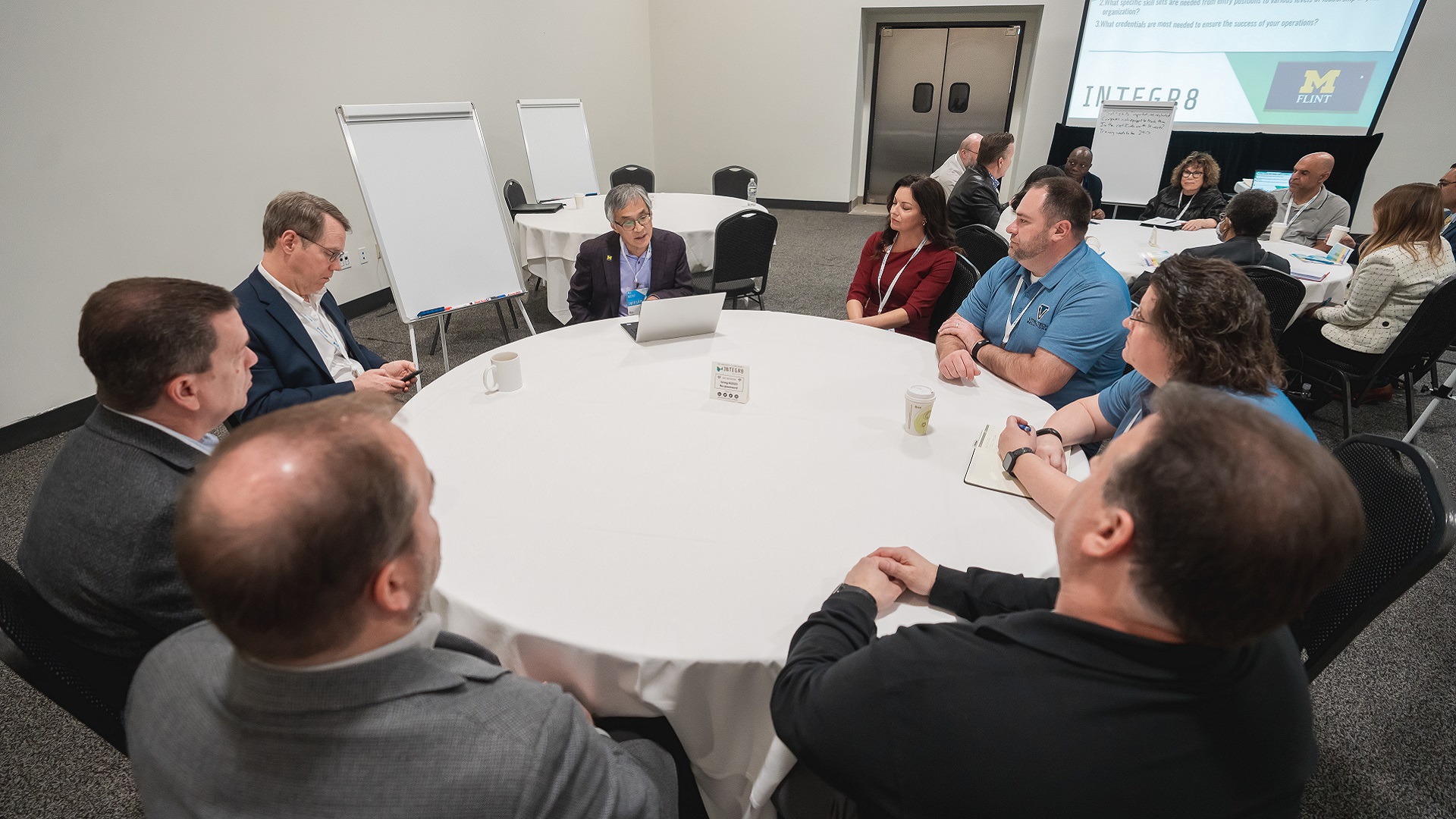On May 9, 2023, the University of Michigan-Flint College of Innovation and Technology hosted a roundtable at Integr8 2023 with the goal of hearing from participants about their professional and development needs. The roundtable dovetailed with the university’s launch of its “Leadership and Communication” certificate — the result of a four-month process from ideation to implementation.
The inspiration for this session was found in the dialogue between the UM-Flint faculty and Lear-Flint’s HR leaders regarding the talent challenges Lear-Flint faces in the job market. This inquiry allowed Lear-Flint to specify the skills required to enhance the success of their Team Leaders. By leveraging its array of 7-week, asynchronous online courses, the university and Lear-Flint collaboratively developed a curriculum that would both address its current needs and be scalable. In light of this success, the University of Michigan-Flint wanted to learn from a wider set of voices and posed three interrelated questions at this year’s Integr8:
• What do universities need to know to better meet your talent needs?
• What specific skill sets are needed from entry positions to various levels of leadership in your organization?
• What credentials are most needed to ensure the success of your operations?
Below are the five key takeaways from the discussions:
1. Continued Relevance of “Soft Skills”
There was a universal recognition that “Soft Skills” remain an area of high demand for employers. Recently reframed as “Power Skills” by Udemy Business’s 2022 Workplace Learning Trends Report, participants reiterated the need for their employees to enhance their communication, collaboration and leadership skills. Discussion also underscored that many college graduates do not possess these skills and that more basic dispositions such as time management, accountability, and being able to provide and accept constructive criticism are disappointingly absent.
2. Employee Utilization
The shortcomings of the euphemism , “build it and they will come” certainly applies to employer efforts to provide professional development opportunities to their employees. As noted in the discussion, companies have a lot of unspent funds and tuition reimbursement programs are woefully underutilized. One potential adjustment would be to change the model that requires employees to entirely bear the initial costs to some voucher system or partial reimbursements up front to lower barriers of entry. Given the need to retain and promote potential leaders within one’s workforce, addressing this challenge is more important than ever.
3. Connecting Knowledge to Practice
Identifying the requisite workforce skills is a necessary, but not a sufficient condition for successful implementation. Accordingly, participants underscored the expanded use of internships, apprenticeships and co-op learning experiences. However, these cannot be simply “added onto” already crowded curricula; the application of technical knowledge and development of “Power Skills” must be embedded in the programs of study themselves. Such initiatives will require greater collaboration between institutions of higher education and employers to create a talent pathway that works for graduates and employers.
4. Connecting Complex Systems
Silos appear to manifest themselves everywhere. Higher education is notorious for erecting disciplinary silos and so it should not be surprising that the fragmentation of specialized knowledge also presents challenges for employers. While there is recognition of the need for disciplinary expertise, it is also the case that the integration technical knowledge across multiple systems is essential and that failure to do so leads to inefficiencies. Building on the need to re-examine higher education’s curricula to meet the challenges of Industry 4.0, attention also needs to be given to integrating knowledge and expertise across learning domains.
5. Raising All Boats
The roundtable began with a brief introduction of the innovative collaboration with Lear-Flint and the University of Michigan-Flint. While such a partnership is vitally important in developing a strong talent pipeline, it was also pointed out that Small and Medium-sized Enterprises may not have the “leverage” to initiate such partnerships, though their talent needs are equally challenging. Work to “bundle” the needs and delivery of workforce professional development for SMEs must go hand in hand with high-profile exemplars of industry-academic collaborations.
Sign up today for a free Essential Membership to Automation Alley to keep your finger on the pulse of digital transformation in Michigan and beyond.
Roy Barnes holds a Ph.D. in Sociology from the University of Wisconsin-Madison and is the Director of the Accelerated Online Degree Completion (AODC) programs and Professor of Sociology at the University of Michigan-Flint. As AODC Director, Dr. Barnes is especially interested in promoting educational collaborations between industry and UM-Flint and can be reached at rcbarnes@umich.edu.




